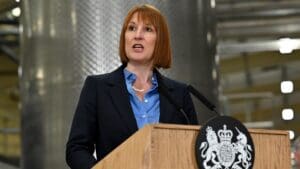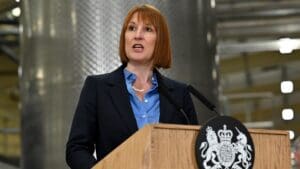Rachel Reeves unveils £15bn regional transport investment to reshape economic narrative


Chancellor Rachel Reeves has unveiled a £15.6 billion package to fund trams, trains and bus networks outside London, as Labour seeks to reset the political narrative ahead of a difficult spending review.
The move is designed to reassure restless MPs—many representing marginal seats—that the government’s capital investment plans will deliver tangible improvements in infrastructure, jobs and growth in the regions.
Speaking in Greater Manchester, Reeves pitched the investment as a “step change” in how government assesses and delivers public spending, promising that the Treasury would rewrite its rules to give greater weight to projects that boost productivity outside the South East. “A Britain that is better off cannot rely on a handful of places forging ahead,” she said. “Growth must be shared—and built—in every part of our country.”
The funding announcement is part of a broader £113 billion capital investment programme set to be rolled out over the parliament, covering transport, housing and energy. Ministers hope it will act as a political counterweight to cuts in departmental day-to-day spending, which the Institute for Fiscal Studies has warned could be “unavoidably tough” given pressures on the NHS, defence and policing.
While capital allocations have already been agreed for sectors such as flood defences and nuclear energy, tensions remain within cabinet over departmental budgets. Home secretary Yvette Cooper and energy secretary Ed Miliband have reportedly resisted settlements they argue are unworkable—particularly in light of high-profile manifesto commitments on policing and green energy.
Yet the government is pressing ahead with its capital agenda, with the transport element of the plan including funding to build a new mass transit system between Derby and Nottingham, upgrade and extend tram networks in Greater Manchester and the West Midlands, and start work on the long-promised West Yorkshire mass transit scheme by 2028. South Yorkshire will also receive funds to renew its trams, while a new railway line between Manchester and Liverpool is under consideration.
Reeves is seeking to frame this investment as something only a Labour government would have delivered. Treasury insiders say the capital funding was unlocked by decisions taken in the autumn budget, including a loosening of fiscal rules on capital expenditure. According to officials, Labour’s approach provides departments with £300 billion more over the parliament than the previous Conservative plans, including £190 billion in extra day-to-day funding.
The Chancellor’s allies acknowledge that next week’s spending review will be politically fraught. With inflation still weighing on household budgets and services under pressure, there is concern that headlines will focus on cuts rather than investment. Ministers have been advised to stress the contrast between what is being delivered and what might have been lost without the additional capital boost.
One senior cabinet minister admitted: “The big risk is that people get the review, turn to the back of the book and see the minus numbers—and the story becomes one of cuts. But the difference is the scale of investment that’s being delivered on top of that.”
Among those still negotiating with the Treasury are Cooper, who is said to have fought hardest over police budgets amid pressure to boost officer numbers and tackle knife crime, and Miliband, who has clashed with the Treasury over funding for the government’s proposed home insulation scheme. Housing secretary Angela Rayner has also been pushing for a larger settlement, with Labour’s previously announced £2 billion for affordable housing now unlikely to be significantly expanded.
Meanwhile, the government has come under pressure from police chiefs and public sector leaders concerned about what they say are unrealistic funding expectations. Last week, Metropolitan Police Commissioner Sir Mark Rowley and other senior law enforcement officials wrote to the Prime Minister warning of “stark choices” about which crimes to investigate if further budget cuts are imposed.
Nevertheless, Reeves and Treasury chief secretary Darren Jones believe Labour’s capital spending can serve as a political lifeline for the party and a proof point of its economic credibility. “We’re investing to rebuild,” said one official. “This is not about austerity—it’s about renewal.”
By focusing on visible improvements to public infrastructure in towns and cities often left behind, Labour is hoping to craft a new story for voters: one of long-term transformation rather than short-term retrenchment. Whether that narrative holds through the release of the full spending review next week remains to be seen.
Read more:
Rachel Reeves unveils £15bn regional transport investment to reshape economic narrative








